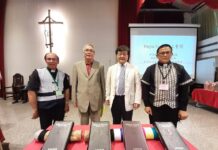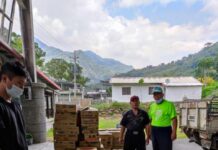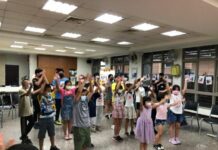Taiwan Church News
3057 Edition
September 27~October 3, 2010
Aborigines protest against illusive Aboriginal Autonomy Act
Reported by Chiou Kuo-rong
Written by Lydia Ma
Photo provided by PCT Indigenous Ministry Committee
The Executive Yuan approved a draft of the Aboriginal Autonomy Act on September 23, 2010, and sent it to the Legislative Yuan for review. According to Premier Wu Den-yih, Aborigine self-rule will operate under a “Three-No Preamble”.
According to reports, this “Three-No Preamble” includes: No change to the current geographical jurisdiction of local governments, no change in the present vested powers accorded to local authorities, and no change to the rights and benefits of non-aborigine residents residing in self-rule regions.
A spokesperson of Indigenous Peoples Action Coalition of Taiwan (IPACT) spoke ardently against the Cabinet-approved draft of Aboriginal Autonomy Act as being merely hot air and showmanship and devoid of substance to the point of demeaning Aborigines, and pointed out that its unveiling was purposely timed ahead of December’s elections to get votes.
IPACT’s dissatisfaction with the new draft was evident and on display when delegates convened at the front of the Executive Yuan the day the draft was sent out and protested ardently against it.
“Aborigine self-autonomy must be real and legitimate!” PCT Indigenous Ministry Committee Secretary and IPACT CEO Rev. Omi Wilang said. This draft not only disrespects Aborigines, but also runs counter to Aboriginal Basic Act.

“This is an outright illusive self-autonomy law!” Icyang Parod said, echoing Omi Wilang’s sentiments. He is a DPP candidate for Taipei City’s year-end elections former President of Council of Indigenous Peoples. He offered his analysis of the “Three-No Preamble” to prove his point.
Icyang Parod explained that, first, the new policy would require all plans involving the creation of autonomous regions to obtain approval from tribal leaders and city or township councils. Since Aborigines live side-by-side with Han people in most townships and Han people outnumber Aborigines, passing such a motion will undoubtedly be an uphill battle.
Second, the draft passed by the Executive Yuan doesn’t give Aborigines real autonomy as it fails to grant them independent judicial and policing powers. These powers, even if they were to be granted to some extent to self-rule areas, wouldn’t overrule or replace existing powers granted to local authorities, creating much overlap and muzzling Aborigine self-rule.
Third, the draft doesn’t require the national government to allot funds to self-governing Aborigine entities as it is usually the case with lower levels of government, such as cities and counties, even though there are old policies requiring it to do so.
“Just think about it – what can local governments do if you strip them of national funding? They are basically broke without federal government transfer funding.”






